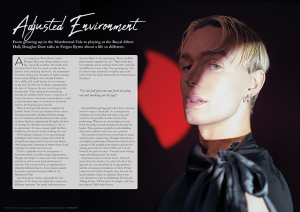From growing up in the Marshwood Vale to playing at the Royal Albert Hall, Douglas Dare talks to Fergus Byrne about a life so different.

As a young boy, West Dorset native Douglas Dare was always drawn to city life, especially London. He recalls how one New Year’s Eve he stood outside on his father’s farm watching fireworks. He remembers his father telling him the glow of lights coming from nearby Bridport was actually London. ‘As a child, all I could dream of was moving to the city,’ he tells me. ‘I always romanticized the idea of living in the city over living in the countryside.’ This yearning for something beyond the familiar fields wasn’t a rejection of home, but more a necessary counterpoint, a need to find another space to nourish his creativity and his developing queer identity.
When I catch up with him, he is indeed now London based. He has just returned from a short European tour and is dealing with that strange mix of exhaustion and disorientation that settles on those that have experienced the highs and lows of touring. He describes the feeling as a ‘bit of an adjustment.’ At times touring might feel like a holiday he tells me but ‘you’re working a lot too.’
We’re talking in advance of an upcoming gig at Bridport Arts Centre on June 21st where he will perform songs from his most recent album Omni along with a selection of others from a back catalogue that spans over ten years.
There’s a palpable sense of anticipation. A hometown show can offer unique opportunities. Douglas also hopes to share some new unreleased material as well as invite local performers to join him. The concert will be an opportunity to blend the different facets of his musical journey. A journey rooted in the green fields of the Marshwood Vale.
Growing up on a farm, surrounded by the rhythms of the land, one might have expected a different trajectory. Yet music had been woven into the fabric of his upbringing. ‘Mum and Dad played music together’ he says. ‘They would play for weddings and in working men’s clubs and pubs and different events when I was growing up. And so almost every weekend I would be put in the back of the the horse trailer with the keyboard and the piano.’
He remembers getting paid a fiver from a waitress when he sang in a local pub. As a youngster he would get up on the table and sing a song and realised it was possible to make money from performing. ‘Whereas no one had given me any fivers for going out and mucking out the pigs!’ he laughs. The experience ignited an understanding that music could be more than just a pastime.
The transition from Dorset countryside to urban sprawl wasn’t a solitary leap. Douglas remembers a serendipitous gathering at Beaminster School where a group of like-minded souls shared a passion for making music. By the time GCSEs and A-levels loomed, the path was clear: ‘I wanted to be writing songs and making music’ he recalls.
Inspiration came in various forms. Classical music from his mother, the rock and roll of her gigs, the jazz records gifted by his grandfather, and the ever-present renditions of Elvis Presley songs from his father. Together they formed the initial stimulus. Later, he replaced these icons with alternatives such as, Radiohead, Portishead, Talking Heads. ‘All the heads’ he laughs, and then, local legend, Polly Jean Harvey.
‘Weirdly, I got introduced to Polly Harvey quite late,’ he says. Despite growing up in the same region, it wasn’t until university that the powerful resonance of her music truly hit home. Discovering the piano-driven White Chalk, an album imbued with its own Dorset echoes, became a pivotal moment. ‘She sort of became my hero’, he recalls. Polly’s trajectory also helped him see that it was possible to go from the farms and fields of West Dorset to a world that had once seemed mystical and inaccessible.
Douglas then went to the Liverpool Institute for Performing Arts (LIPA) in a city with its own vibrant musical heritage. The experience proved transformative, not just for the formal training but for the community it fostered. A small, close-knit cohort of musicians, dancers, and technicians created an environment that felt like an extension of college. As well as a fertile ground for collaboration and growth, LIPA provided yet another boost to his inspiration in the form of a one-to-one session with musical icon Sir Paul McCartney.
‘I was shit scared—terrified’ he remembers. A lifelong Beatles fan, as well as of Paul’s solo music, the prospect of sharing his work with such an iconic songwriter felt both daunting and surreal. He played Paul a song he’d written about the London Underground as a wartime bomb shelter. It turned out McCartney’s parents had met in a similar environment. Then came the unimaginable: McCartney harmonizing on the song and offering gentle guidance at the piano. Douglas asked him about his song Jenny Wren which led to an impromptu performance by the legend himself.
He gave Paul a CD of his music which he promised to listen to in the car. Did he ever listen to it? Only Paul can answer that. It remains a cherished, if unresolved, memory. The extraordinary encounter wasn’t something Douglas talked about much. He decided it shouldn’t be flaunted but rather absorbed as a personal milestone to be processed over time.
Whatever the early influences and foundations, there is a lyrical depth to Douglas’s first three albums that points to a songwriting structure that starts with poetry which is then put to music. ‘I started with the lyrics because I wanted the lyrics to stand up on their own’ he says, ‘regardless of the music.’ This poetic foundation led to early performances that were as much spoken word as song.
Like many poets and songwriters Douglas’s work mirrored a journey of self-discovery. Early songs were often historical or fictional and as he grew in confidence he turned his gaze inward. ‘The reason I was writing songs about the London Underground was because I felt I didn’t have my own life experiences that much yet. So, I was writing stories.’
Apart perhaps from the achingly beautiful Oh Father from his Aforger album, his third album, Milk Teeth, marked a significant shift towards a confident and more open exploration of his childhood memories. It is an intensely personal record. However, while cathartic it also proved to be emotionally consuming, leading to a conscious decision to move away from the autobiographical with the subsequent album, Omni.
Milk Teeth was ‘an incredibly personal record’ he says. ‘I was quite exhausted by it.’ He came away from touring the record feeling that it was ‘quite self indulgent, in a sense, because it’s all about me.’ This led to a deliberate shift with Omni, where he consciously moved away from autobiographical themes.
Musically, Omni also represented a dramatic departure, embracing beats and basslines, a stark contrast to the lyrical piano-driven sound of previous work. This deliberate change was a means of creative reinvention, as well as a way to keep pushing boundaries. It also tipped a hat to his love of dance and rave culture. The live shows during this era were equally transformative, incorporating strobe lights and club environments, a far cry from the intimate piano performances.
He acknowledges the starkness of the change may have confused those drawn to his piano based work and has since returned to the piano. He describes Omni as something he ‘needed to do’, like a stepping stone onto the next thing. ‘Now I’m back to playing the piano and storytelling and writing stuff from personal experience, and it’s about adults experiences as well.’ Omni is promoted as about reconciling the different sides of himself: “the songwriter, the raver, the lover and the observer.”
A recent highlight for Douglas was an invitation to perform at The Royal Albert Hall to support a Teenage Cancer Trust charity. Playing solo on the grand piano, the same instrument that he’d seen Rufus Wainwright play on just a few months previously, felt like a surreal culmination of aspirations. ‘If you’d asked me six months ago, where’s the dream place to play, I would have said the Royal Albert Hall.’ The hushed reverence of the audience, the pin-drop silence in the vast hall, underscored the power of the music and the importance of the cause.
From the quiet fields of the Marshwood Vale to the grand stage of the Royal Albert Hall, Douglas Dare’s musical journey celebrates an artistic evolution in full flow. Though born out of family and place and driven by the restless spirit of artistic exploration, it is being honed by a determined aspiration that has the potential to develop a lasting legacy within the music industry.
The homecoming performance at Bridport Arts Centre on June 21st promises to be a fascinating mix of echoes from the past alongside glimpses of musical landscapes yet to be travelled. To book tickets visit www.bridport-arts.com.



